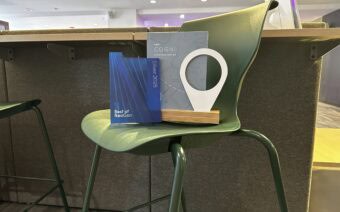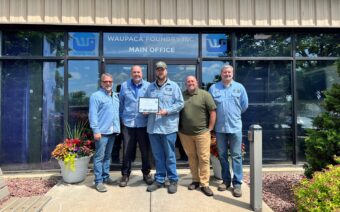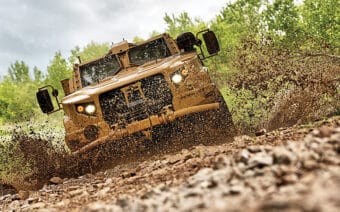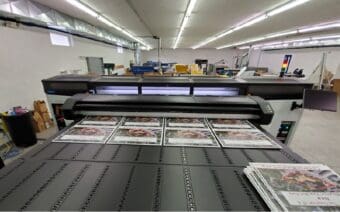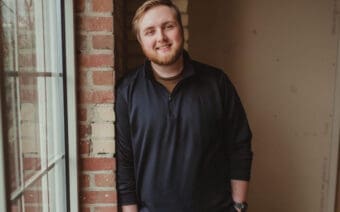
March 5, 2024
GREEN BAY — Though American Tent’s 10-year journey has not been without its ups and downs, Owner and CEO Tony Ehrbar said he is proud of what the company has achieved in the last decade.
“Most businesses don’t make it that far, but we are still here and better than ever,” Ehrbar said.
Setting up shop
Ehrbar said the American Tent journey began when he had a “crazy” dream to move back to the Green Bay area — he was living in North Carolina at the time — and become an entrepreneur.
At the time, he said a tent rental business was available for purchase because its owner wanted to get out of the tent manufacturing business — so he took a chance.
In February 2014, armed with little more than some equipment and a customer list, Ehrbar said he proceeded to hire a few employees and began to incrementally grow the business.
American Tent offers commercial party tents for two key segments — rental companies that, in turn, rent the tents; as well as selling directly to bars, restaurants, schools, healthcare organizations and others who need tents for events.
Ehrbar said the company’s reach spreads throughout the United States, as well as the Caribbean and South America.
Though he sees American Tent as his entrepreneurial success story, Ehrbar said it wasn’t necessarily something he saw coming — especially since he originally pursued degrees in chemistry before switching to business.
“We started with five team members and three pieces of equipment in a 5,000-square-foot warehouse, and in the early years, I performed all the administrative functions,” he said. “Fortunately, I was able to find amazing people along the way to lead sales, marketing, accounting, human resources and purchasing to new heights.”
When the business started, Ehrbar said putting a tent together entailed cutting out pieces of vinyl, sewing and welding to create the tent top and sidewalls.
He said American Tent had an old welding machine, as well as a sewing machine, but employees had to cut material on the floor using big rulers.
Over time, Ehrbar said he was able to purchase a cutting table to cut shapes and patterns, resulting in a much nicer end product, as well as additional welding equipment.
Efficiency, he said, followed.
“When we made a side wall — a rectangular piece with stuff sewn around it — it used to take two people and 20 minutes to make it,” he said. “Now, a machine can do that in 30 seconds.”
Product options, Ehrbar said, have grown over the years as well, building on the original two basic models of tents — frame tents and pole tents (the ones most people associate with a circus).

American Tent manufactures custom-made tents, including this green and gold striped tent. Submitted Photo
The business also made several versions of sidewalls, but he said American Tent was limited in offerings until it purchased the assets of TentSidewalls.com in 2017.
“It was the perfect acquisition because it allowed both of us to stay true to our core businesses,” he said. “It was perfect to expand our products while also making processes more efficient.”
Ehrbar said the growth continued when American Tent acquired Giffy Ballasts, which made an alternative to “weighing” tents down with cement blocks — but rather a ballasting system that can’t be staked into the ground.
He acquired the patented solution, which he said has been a significant benefit to the sales team as the ballasts are easier to transport and use than cement or other weighty solutions.
“A tent is like a big kite, and the optimal method is to stake it into the ground,” he said. “But if you are on cement or asphalt, you need a different ballasting system.”
In addition to offering these ballasting products, Ehrbar said American Tent has added several accessories, including drop cloths for use when setting up tents over the years.
Moving on up
As the business grew, Ehrbar said American Tent was running out of space.
The company relocated a handful of times over the years — from its original location in a 5,000-square-foot building to a 35,000-square-foot building, to its current 110,000-square-foot location on the back side of the East Town Mall on Green Bay’s east side.
Ehrbar said when area developer Garritt Bader showed him the space American Tent is currently in, he had a hard time envisioning it as more than a mall.
“Garritt said something needed to happen with East Town Mall,” he said. “He said the project would only work if he could turn the mall inside out and use the back end for a quieter manufacturer who doesn’t need a front-facing entrance. I couldn’t see it then, but the space gives us more room and a better flow. It’s been a game changer for us.”
COVID-19 throws a curveball
Throughout its tenure, Ehrbar said American Tent experienced steady growth until the COVID-19 pandemic hit.
He said his initial thought was the business would be devastated because they work in the event space.
But three weeks in, as more and more businesses and people sought tents to do things outside, Ehrbar said the complete opposite happened.
“COVID grew our business five times almost overnight,” he said. “It started with people seeking tents for mobile hospitals, but then everyone wanted to be outside — schools for classes, bars and restaurants that were still open, churches that wanted to hold masses outside. Everyone came out of the woodwork needing a tent, and we were an essential business to help people get outside.”
However, the increase in business, Ehrbar said, didn’t happen without growing pains.
While sales grew, he said the business’s working capital needs also increased.
Ehrbar said inventory jumped to five times what it was pre-COVID because it was scarce — many suppliers held inventory for larger jobs and prices went up.
American Tent, he said, overbought in many cases to make sure they had enough safety stock. Meanwhile, Ehrbar said accounts receivable grew six times because the business had more institutional customers, such as hospitals and schools that only pay on net 30-day terms.
“Luckily, we were able to raise money from investors and secure an EIDL (economic injury disaster loan) loan through the Small Business Association and get a line of credit through our bank,” he said. “Revenue is important, but cash is king. There were a couple of times we were low on cash, but we navigated it, and I’m proud of the team for doing that.”
Ehrbar said the craziness from COVID only settled into a more “normal” year in 2023, returning to a steady pace.
“That said, we’re still four times bigger than we were before COVID,” he said.
Differentiators in the tent space
Ehrbar said three key factors distinguish American Tent from its competitors:
Its made in the U.S.A. approach to businessConsultative sales approachFocus on being a source of education regardless if the end users end up being customers
“People don’t have to wait for the slow boat from China to secure a tent,” he said. “Our lead times are the best in the industry. We can normally get (a tent out) in less than a week, and in some cases, one to two days. We’ve had people tell us they’re being quoted 12-14 weeks from others.”
In addition to delivering fast, Ehrbar said American Tent seeks to deliver well — which is where the sales team’s consultative sales approach comes in to ask questions and deliver solutions.
“We don’t want to be order-takers,” he said. “We want to tailor each experience to the customer and solve a problem for them.”
A complement to that, Ehrbar said, is reiterating the importance of safety and education.
He said his goal is for prospective customers to be properly educated, which is why American Tent produces so many training and product videos.
“The first place people go when they need a tent is Google, and we want them to be educated and make the right decision,” he said.

Tony Ehrbar
Finally, the team strives to deliver what Ehrbar refers to as “white glove service.”
He said this may entail sending a tent expert on-site to set up and train the customer — especially when it’s one of the many custom tents they produce — to meet the company’s goal of meticulous attention to customersí needs.
“We take great pride in making sure we provide a nice experience for customers,” he said.
An example of that, Ehrbar said, is a customer in California who has a new restaurant concept with an oven that produces a high-quality pizza in 90 seconds.
He said the customer’s business model entails having a tent at every location as the business grows.
The business owner, Ehrbar said, secured a tent from American Tent but said it made more noise than he expected as a result of the wind, which Ehrbar said isn’t unusual because tents sit on metal.
“That said, he has a specific vision for what he wants to provide to customers,” he said. “I said, ëwell, we have a different model of tent, but let me fly out and see if we can make this work for you.í”
Another example, Ehrbar said, entails providing support to another business within the industry.
He said a company that sells fireworks throughout the country bought a tent rental business but didn’t know the first thing about renting tents.
Ehrbar said he is going to fly to their location as they set up a new facility to provide insights into how to design the facility, as well as share other advice and set up a few tents.
“We’re meeting with their team long-term, pro bono, as they could become long-term customers,” he said.
Industry game changer
Though American Tent’s offerings are rooted in the PVC market, Ehrbar said he wanted to offer an alternative to that and discovered it in Korea.
There, a woman with a sustainable alternative to PVC sought to commercialize her recyclable, non-toxic alternative product, and Ehrbar said he sought to become the distributor of it for both North and South America.
Securing that, he said, prompted the establishment of another company, Renegade Plastics, of which he is the co-founder.
“We’re about three years in on that business and have made a lot of traction with it, including in customers in the outdoor industry,” he said. “We’re also putting it into our commercial-grade tent line (at American Tent). Our product development roadmap this year includes eight new products.”
Ehrbar said Renegade Plastics is housed at American Tent — with about 20,000 square feet dedicated to it.
The polypropylene-based fabrics, he said, are not only non-toxic but lighter weight and more chemically and UV resistant.
“Our revolutionary fabrics are used in everything from bus seats to billboards, to flexible packaging, to outdoor and sports equipment, (as well as tents),” he said.
Ehrbar said the fabrics are ideal for tents or fabric structures “because they emit no fumes.”
“(But, they) are still durable, flexible, fire retardant, lightweight and easy to clean, transport and store,” he said.
Hard-won business lessons
Ehrbar said celebrating 10 years in business prompted him to take a pause and reflect on some of his biggest lessons in business ownership.
“I’ve learned running a business is essentially failing, learning and growing,” he said. “I wasn’t used to failing, and I didn’t like it, but that’s the nature of a growing business. I have had to detach failing from being a failure as those are two different things.”
Ehrbar said he’s learned to try to quell his impatience, as he wants everything to materialize yesterday, to celebrate wins and to invest in an excellent operating system.
He said he also attributes the company’s closely-held vision, mission and values to driving its day-to-day business and credits his amazing employees with making American Tent’s success possible.
“We’ve grown to 42 amazing team members who all live our company values and take pride in their work every day,” he said. “Our mission is to empower people to be the best version of themselves, which I am proud of.”

An American Tent production employee sews tent fabric at the company’s Green Bay facility. Submitted Photo
Ehrbar said team culture is at the heart of the company’s success.
“We want people to come to work and to be excited and proud of what they’re doing, and to always do more, better,” he said. “I know, it’s not the best phrase grammatically, but it’s about continuous improvement and taking the initiative to do that.”
Ehrbar said he has a physical reminder to himself — a tattoo on his arm — to act like a buffalo — which is the only animal that charges into a storm.
“It’s a reminder to face challenges head-on,” he said.
Ehrbar said it’s also why he’s more than willing to sit on the phone with a rental business that seeks his feedback.
“It’s my favorite thing to do,” he said. “I know how hard it was to grow my business with limited capital, and helping other people is what gets me out of bed in the morning.”
Ehrbar said there are more people than he can count who have helped him and American Tent arrive where it is today.
He said his goal with all he does is something he said his grandfather Ernie emulated.
“He was a ëleave things better than you find themí kind of guy,” he said. “And with a national business like American Tent, the sky is the limit.”
For more, visit americantent.com.
 Welcome to Camp Elsewhere – a woodsy retreat
Welcome to Camp Elsewhere – a woodsy retreat Providing customers with ‘sunshine after sunset’
Providing customers with ‘sunshine after sunset’

